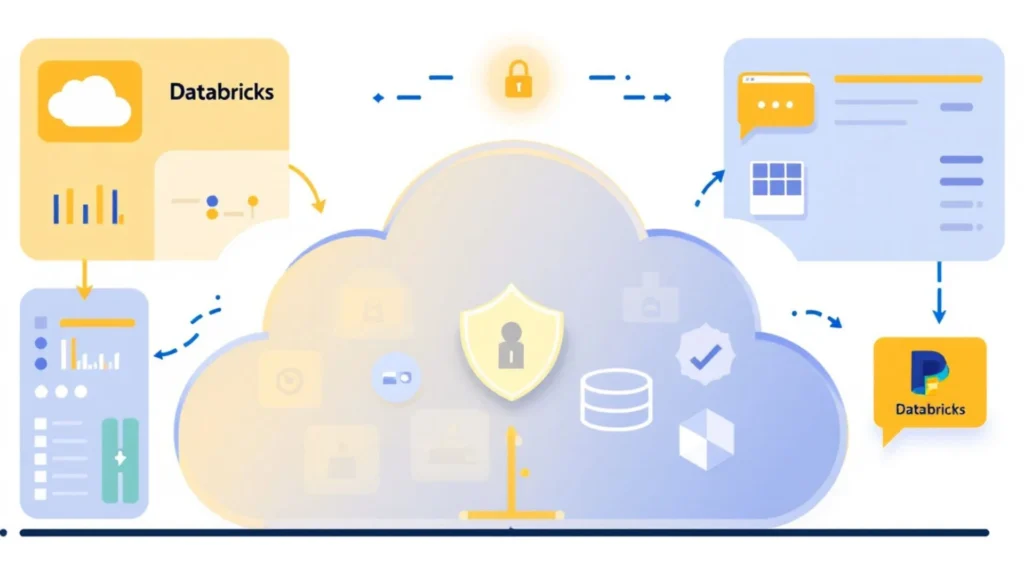Ensuring Data Security & Compliance in Cloud Migration with Databricks
Author: Laila Meraj
31 January, 2025
Data is a pivotal asset for organizations, and ensuring its security and compliance during cloud migration is paramount. As businesses increasingly rely on cloud platforms for data storage and analytics, the need for strong security measures becomes more critical. Databricks, a leader in the data analytics space, offers a comprehensive framework that addresses these concerns effectively. This blog explores how Databricks ensures data security and compliance during cloud migration, highlighting its key features and best practices.

Understanding the Importance of Data Security in Cloud Migration
Migrating to the cloud presents numerous advantages, including scalability, flexibility, and cost-effectiveness. However, it also introduces significant risks related to data breaches and non-compliance with regulations. According to the IBM Cost of a Data Breach Report, the average cost of a data breach is approximately $4.88 million. Therefore, organizations must prioritize security measures to protect sensitive information during migration.
Databricks provides a multi-layered security framework that safeguards data throughout its lifecycle. This framework encompasses various aspects such as encryption, access control, and monitoring, ensuring that data remains protected from unauthorized access and breaches.
Key Security Features of Databricks in Cloud Migration
1. Multi-Layered Security Approach
Databricks employs a multi-layered security strategy that includes network security, infrastructure security, user management, and detailed logging. This comprehensive approach ensures that data is protected at every stage of its lifecycle, minimizing vulnerabilities that could lead to breaches.
2. Encryption
All data at rest is encrypted using server-side encryption with keys managed by the cloud provider (AWS, Azure, or GCP). Databricks also allows the use of Customer Managed Keys (CMKs) for organizations that require more control over their encryption processes. This encryption extends to code, models, credentials, and intra-cluster data transfers, ensuring that sensitive information remains secure.
3. Role-Based Access Control (RBAC)
Databricks utilizes RBAC to define user permissions based on their roles within the organization. This feature allows for fine-grained access control through the Unity Catalog, enabling organizations to manage who can access specific datasets or resources effectively.
4. Private Networking
To prevent unauthorized data exposure over public networks, Databricks supports private networking options like AWS PrivateLink and Azure Private Link. This ensures secure communication between services without exposing data to the public internet.
5. Enhanced Security Monitoring
Databricks offers an Enhanced Security Monitoring add-on that provides advanced logging capabilities. Organizations can track security events and generate audit logs to facilitate compliance audits and rapid root cause analysis in case of incidents.
6. Authentication and Authorization
Strong authentication methods such as Single Sign-On (SSO) and Multi-Factor Authentication (MFA) are supported to enhance user verification processes. This helps mitigate risks associated with account takeovers and unauthorized access.
Key Compliance Features of Databricks in Cloud Migration
1. Compliance with Industry Standards
Databricks adheres to various industry standards. The platform provides tools that help organizations create compliance profiles tailored to their specific regulatory needs, ensuring that they meet legal requirements throughout the data lifecycle.
2. Compliance Security Profile
The Compliance Security Profile feature allows organizations to assess their Databricks environment against specific regulatory requirements. This includes providing FIPS 140 Level 1 validated encryption modules for workloads that process sensitive information.
3. Audit Logs and Reporting
Comprehensive audit logs are generated by Databricks, capturing user activities and system events. These logs are essential for compliance reporting and can be integrated with Security Information and Event Management (SIEM) tools for real-time monitoring.
4. Data Governance with Unity Catalog
The Unity Catalog provides centralized metadata management and fine-grained access controls for structured and unstructured data. It enables organizations to maintain data lineage and auditing capabilities, which are crucial for compliance with various regulations.
5. Regular Compliance Audits
Organizations are encouraged to conduct regular audits of their Databricks environments to ensure ongoing compliance with applicable laws and regulations. The platform supports these audits by providing detailed logs and monitoring capabilities that facilitate compliance assessments.
The Role of Xorbix Technologies in Safer Cloud Migration
As organizations navigate the complexities of cloud migration and data management, partnering with experts like Xorbix Technologies can provide valuable insights and solutions tailored to specific needs. As an expert Databricks partner, we specialize in Databricks services that can enhance your organization’s ability to leverage Databricks effectively while maintaining rigorous security standards. Xorbix Technologies offers comprehensive solutions that ensure seamless integration of Databricks into your existing infrastructure without compromising on security or compliance.
The Future of Data Security with Databricks
As technology evolves, so do the threats posed to data security. Organizations must remain vigilant in adapting their strategies to counteract emerging risks. Databricks continues to innovate its offerings by integrating advanced technologies such as Databricks Genie into its platform. This innovation not only enhances analytical capabilities but also improves security measures through advanced machine learning algorithms that detect anomalies in real timetime.
The integration of Databricks Delta Lake further strengthens data governance by providing reliable data storage solutions that ensure consistency across datasets while maintaining high levels of performance.
Conclusion
Ensuring data security and compliance during cloud migration is not merely an option; it is a necessity for organizations looking to safeguard their valuable assets in today’s digital landscape. Databricks provides a comprehensive suite of features designed specifically for this purpose, enabling businesses to migrate confidently while adhering to industry regulations.
By leveraging the capabilities of Databricks alongside expert guidance from Xorbix Technologies, organizations can effectively navigate the complexities of cloud migration without compromising on security or compliance standards.
Learn more about our related services here:




